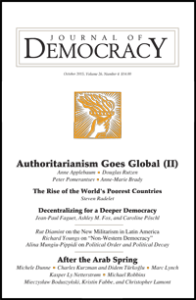In Sudan, tens of thousands of demonstrators are sitting in to demand the ouster of their longtime ruler. In Algeria, millions of protesters forced out their own octogenarian leader last week. And in Libya, an aging general is battling to establish himself as a new strongman, promising to end the chaos that kicked off when Libyans threw out their own dictator eight years ago, David D. Kirkpatrick writes for The Times:
Veterans of the Arab Spring struggles say the scenes feel like flashbacks to chapters of a common story. The masses now clamoring for the removal of President Omar Hassan al-Bashir of Sudan evoke the crowds that gathered in Tahrir Square in Cairo or outside the Tunisian interior ministry eight years ago.
 “History repeats itself,” Islam Lotfy, a leader of the Egyptian uprising of 2011 who is now living in forced exile in London, said ruefully. “It’s déjà vu for us.”
“History repeats itself,” Islam Lotfy, a leader of the Egyptian uprising of 2011 who is now living in forced exile in London, said ruefully. “It’s déjà vu for us.”
Rep. Karen Bass (D-Calif.), Chair of the House Foreign Affairs Subcommittee on Africa, called on Sudan’s government “to refrain from all violence and to respect citizen’s rights to freedom of assembly and expression.”
“The United States supports the Sudanese people’s desire for democratic, representative governance and the freedom to exercise their civil liberties,” said Bass, a board member of the National Endowment for Democracy. “These events taking place are very concerning to the international community and I am committed to ensuring that the government respects the human rights of all people in Sudan.”
Security forces in Sudan reportedly killed at least eight protesters from April 6-8, 2019 and injured dozens during lethal attempts to disperse peaceful protesters, Human Rights Watch said today:
On April 6, thousands of protesters converged on the army headquarters calling for President Omar al-Bashir to step down. The Sudan Professionals Association, one of the groups spearheading the protests, and opposition groups have called for protests and sit-ins, which began in mid-December 2018, to continue until al-Bashir steps down. Al-Bashir is wanted by the International Criminal Court for atrocities in Darfur.
 “Sudan’s leaders need to bring an end to the violence against peaceful protesters. Such brutal crackdowns are unjustified, unlawful, and counterproductive,” said Jehanne Henry, associate Africa director at Human Rights Watch. “They should respect the right of Sudanese people to peacefully protest.”
“Sudan’s leaders need to bring an end to the violence against peaceful protesters. Such brutal crackdowns are unjustified, unlawful, and counterproductive,” said Jehanne Henry, associate Africa director at Human Rights Watch. “They should respect the right of Sudanese people to peacefully protest.”
 Intra-elite rivalry might offer a glimpse of things to come in a new era…Some officials and experts worry that Sudan might suffer the same chaos and violence that plagued Libya after the fall of Muammar al-Qaddafi in 2011, Foreign Policy suggests:
Intra-elite rivalry might offer a glimpse of things to come in a new era…Some officials and experts worry that Sudan might suffer the same chaos and violence that plagued Libya after the fall of Muammar al-Qaddafi in 2011, Foreign Policy suggests:
“When you have an intricate patronage-based system, removing the president is like decapitating the head in a drug cartel, said Alex de Waal, the Tufts professor. “You will get an outbreak of rivalry among the oligarchs, which could become a civil war. “The issue in Sudan is not authoritarianism versus democracy. It’s, do you have a well-organized autocracy, a coalition of security chiefs, or anarchy? The worst is the free-for-all,” he said.
“The fear of another Libya certainly looms over this problem set,” said Judd Devermont, a former senior CIA analyst now at the Center for Strategic and International Studies. “The trick is, how do you remove Bashir without dismantling the state?”
 “That is a good indication of how worried they are,” said Khaled Dawoud, an Egyptian journalist who participated in the Arab Spring uprising and for a time became the president of a liberal political party, The Times adds:
“That is a good indication of how worried they are,” said Khaled Dawoud, an Egyptian journalist who participated in the Arab Spring uprising and for a time became the president of a liberal political party, The Times adds:
Some Egyptians, he said, still take pride in setting the template for the nonviolent uprisings now flaring in Algeria and Sudan. “The power of the people has proved to be alive, and the desire to have a president who does not stay for life,” Mr. Dawoud said. “The model we set in 2011 remains alive despite the tremendous efforts to crush and distort it.”







